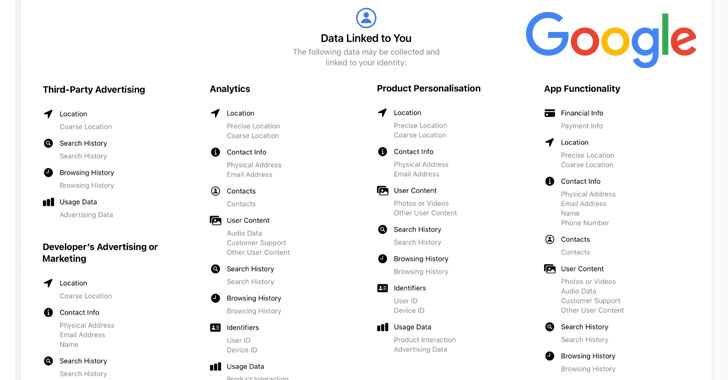Google Reveals Data It Captures
Since Apple doesn’t make a lot of money by selling your data to others (or selling targeted ads to others based on data that it captures), it loves poking Google in the eye about its data collection practices.
Apple required “privacy nutrition labels” by vendors, including themselves, for all new releases of software distributed in the app store as of December 8th of last year.
Google’s response was to stop updating its software. Some people said that was because Google didn’t want to tell people what they were collecting. I suspect that it is more likely that Google was trying to figure out exactly what data they were collecting.
Here is an example of some of the data that Google collects:

This is an effort on Apple’s part to give people more information and help them understand whether they want use an app or not. But this is not where they are ending and the next step will hurt Google (and others) even more.
The graphic below compares the data the the search engine Duck-Duck-Go collects compared to the data collected by Google Chrome and the Google App. Click on the graphic below to expand it. Even before that you can see just by the number of bullets the difference between Duck-Duck-Go and Google.

Starting with iOS 14, all apps will not only have to tell users what data they are collecting but also get their permission to do it – what is known as “OPT-IN”. Opt-in is the advertiser’s nightmare. Basically, it requires the advertiser to say to the user “we want to collect, store forever and sell all this data we collect about you and your browsing or other habits, use it however we want without telling you how, not give you any control over that and in exchange – in exchange we are going to give you this app or maybe shove a bunch of ads in your face that you don’t want to see”.
In fairness, if you say no you will still see ads – they just won’t be targeted to you.
This means that the companies won’t be able to get as much money for those ads since the advertisers won’t know who those people are that are seeing those ads. WHAT IS UNKNOWN IS HOW MANY PEOPLE WILL ACTUALLY OPT IN.
Add to that, consumers have to trust app makes to tell the truth. After all, what is the downside if you lie? If Apple finds out, they could ban you from the App Store.
In iOS 14.5, Apple will require apps to get your permission to track you across other apps and websites. Apple has something called an ID for advertising or IDFA. Using IDFA, if Facebook showed you an ad for say a phone and you did not click on it, but you went to Google and searched for that phone.
Then you bought the phone. That vendor has your IDFA, can share it with Facebook and then Facebook gets credit an ad that was converted to a sale.
All this goes away, in stages, with iOS version 14 and 14.5 if the user does not opt in.
The reason this is a problem for Google and other advertisers is that users usually choose the default. The default is that if I don’t do anything, I effectively opt out and Google and the advertisers can’t target me.
That alone might be a reason to buy an iPhone.
Don’t expect Google to do that on Android any time soon. Or ever.
Credit: The Hacker News
